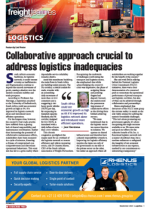South Africa's economic backbone, its logistics network, is under intense scrutiny as inefficiencies and fragmentation continue to impede the smooth movement of goods, casting a shadow over the nation's economic stability and trade prospects.According to Professor Jan Havenga, a logistician attached to the University of Stellenbosch, South Africa could see economic growth as high as 6% if it improved its logistics network alone and introduced more efficient operations.For the longest time, however, the country’s vital trade arteries have suffered from a glaring lack of shared responsibility and maintenance coordination. Rather than harnessing the potential of collaborative maintenance efforts, stakeholders have been ensnared in a cycle of mistrust, fostering a climate of compromised cost competitiveness and discordant operational behaviours. This toxic mix has led to a grim reality where dependable service reliability remains elusive.Amid this tumultuous backdrop, the trade f lows in South Africa are buckling under pressure. The N3 corridor, a critical conduit for trade, wrestles with an astonishing daily movement of more than 12 000 containers and a staggering 9 540 heavy goods vehicles (HGVs) per day, far surpassing its intended capacity. Similarly, the N4 corridor, designed for 600 HGVs, is inundated with a daily inf lux of more than 1 800 vehicles. This chronic congestion spotlighted the urgent need for an overhaul of the logistics network to restore efficiency and relieve mounting strain, said Dr Juanita Maree, CEO of the South African Association of Freight Forwarders. Recognising the multitude of challenges confronting the transport and logistics sector, she emphasised that while acknowledging the country's crisis was imperative, the phase of assigning blame and pointing fingers had elapsed. Instead, she underscored the paramount importance of collaborative efforts as the driving force behind achieving success.“ We mu st understand that in the logistics sector we cannot function in isolation. We operate on shared infrastructure and therefore have a shared responsibility towards it. Improving our logistics efficiency requires the input not only of the government on one side or the private sector on the other, but rather an approach where all stakeholders are working together for the benefit of the country.”She said with B4SA rallying behind the National Logistics Crisis Committee's (NLCC) initiatives, there was a clear demonstration of a concerted push to resuscitate the operational performance of pivotal transport and logistics corridors, but also of what can be achieved through collaboration and partnerships.Maree emphasised that detractors of the NLCC must grasp the current reality: it stands as the sole viable avenue for tackling the nation's formidable challenges. "This isn't about promoting any government agenda; it's about recognising the single recourse available to us. We must unite and pool our efforts for the collective benefit of SA Inc. A functional logistics network isn't a matter of political sway, but a resolute endeavour to safeguard the integrity of our economic infrastructure at any expense, marked by our commitment to unwavering transparency."

